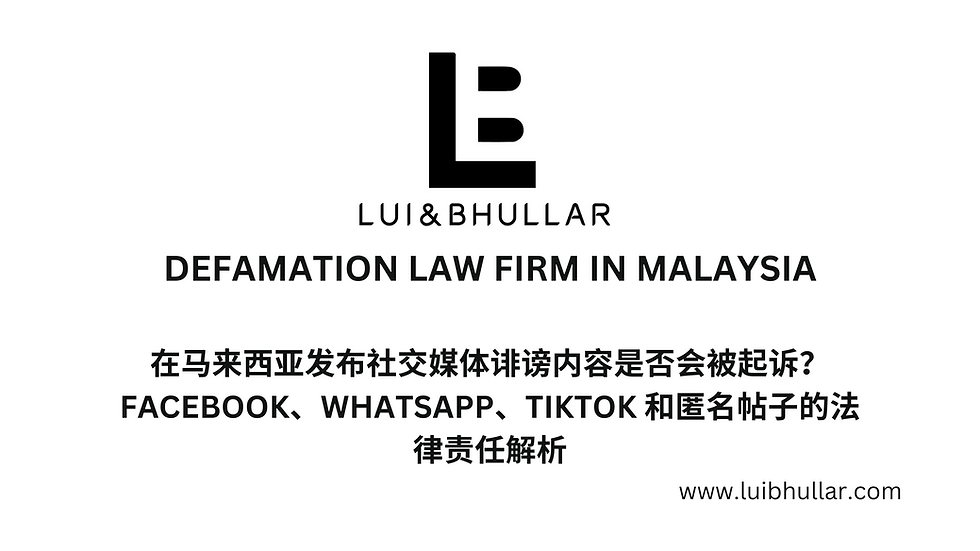Insights From A Defamation Lawyer: Political Defamation Case: Lim Guan Eng v. Mahiaddin Md Yassin
- Messrs Lui & Bhullar
- Jul 3, 2025
- 2 min read
Updated: Oct 15, 2025
By: Messrs Lui Bhullar

Defamation Case: Lim Guan Eng v. Mahiaddin Md Yassin [2025]
In a significant High Court decision, Lim Guan Eng v. Mahiaddin Md Yassin, the court ruled in favour of the plaintiff, YB Lim Guan Eng, awarding him general, aggravated, and exemplary damages in a high-profile defamation suit against Tan Sri Mahiaddin Md Yassin, the former Prime Minister of Malaysia.
Background of the Defamation Claim
The plaintiff, former Finance Minister Lim Guan Eng, initiated legal proceedings over three public statements made by the defendant in March 2023. These statements, made via Facebook posts and press interviews, alleged that Lim had revoked tax exemptions previously granted to Yayasan Al-Bukhary—a foundation known for its Islamic charitable work.
These statements intertwined allegations of financial misconduct with racial and religious overtones, suggesting that the plaintiff acted with malice against a Malay-led, Islamic organisation. The defendant failed to verify these claims, despite having the means to do so, and proceeded to make inflammatory remarks widely circulated by the media.
Key Legal Issues and Findings
The court considered whether the statements:
Were defamatory of the plaintiff;
Referred specifically to the plaintiff;
Were published publicly;
Were protected by the defences of justification, fair comment, or qualified privilege.
After an in-depth review, the court found:
Defamatory Meaning Proven: The statements lowered the plaintiff’s standing in society, implying vindictiveness, misconduct, and racism in the discharge of his duties.
No Factual Basis: The defendant could not prove the truth of the allegations. Evidence from the Ministry of Finance confirmed that no directive had been issued by the plaintiff to cancel the tax exemptions.
Defences Rejected:
Justification failed due to absence of supporting evidence.
Fair comment failed as the statements were presented as facts, not opinions, and lacked a factual foundation.
Qualified privilege failed due to the defendant’s failure to verify facts and the court’s finding of malice, especially in inflaming racial and religious sentiment.
Publication Confirmed: All three statements were widely disseminated, with the defendant’s Facebook account followed by a large audience, and further media amplification by national outlets.
Damages Awarded
The court awarded general, aggravated, and exemplary damages, citing:
The defendant’s high public stature,
The serious nature of the false allegations,
The need to vindicate the plaintiff’s reputation, and
The broader public impact of racially and religiously charged misinformation.
Significance for Defamation Law in Malaysia
This case underscores the judiciary’s stance that freedom of speech must be exercised responsibly, especially by public figures. It also affirms that unverified allegations, particularly those invoking racial and religious sensitivities, will not be tolerated.
The ruling serves as a critical reminder that defamation lawyers in Malaysia can successfully challenge false statements that damage reputation, especially in high-stakes political or public contexts.
Need Legal Advice on Political Defamation?
If you're unsure how to sue for defamation in Malaysia or need to identify the person behind defamatory online content, consult our legal team today. At Messrs Lui & Bhullar, we combine strong legal strategy with digital expertise to hold online defamers accountable.
📧 Email: general@luibhullar.com
📞 WhatsApp: +60143000970




Comments